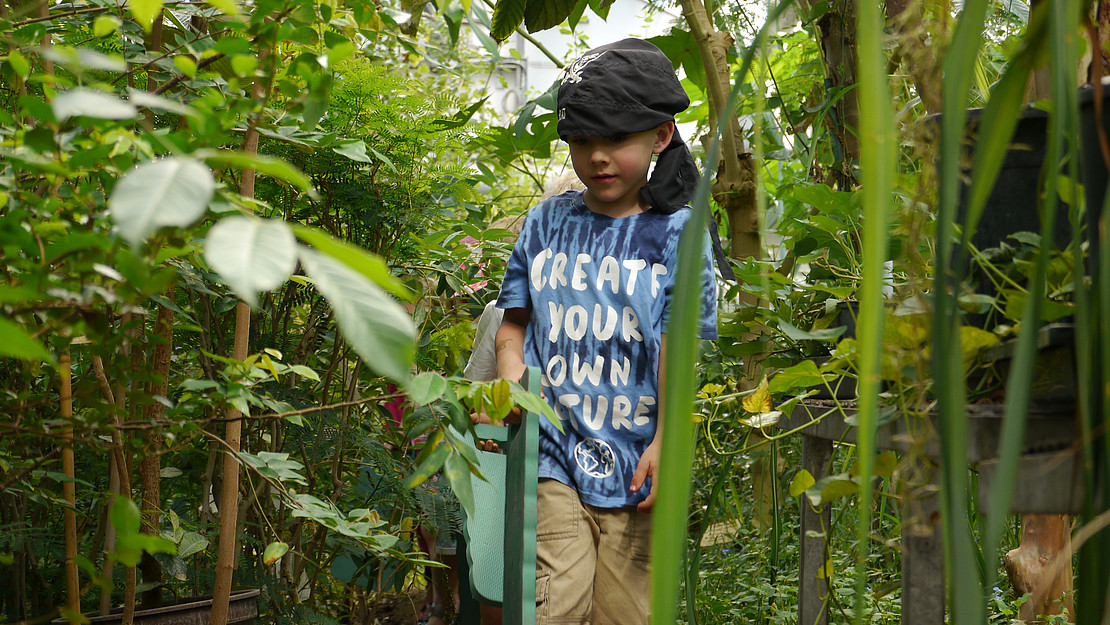This page contains automatically translated content.
Consumption, trade, biodiversity: plants are also "political"
 Image: Daniel Liepold.
Image: Daniel Liepold.The political plant
The term "political plant" referred to the fact that wild and cultivated plants, including those in agriculture, could be the subject of political deliberation, legislation, ownership, or even common ownership. Plants could be "political," for example, when they are protected as wild plants by laws and regulations. Or when the production, trade, or use of food, energy, or fiber leads to critical questions. These complex interrelationships are to be brought closer to various target groups through the project.
Series of events in eight German states
"We want to use various event formats to familiarize participants with the social and political significance of plants," says Marina Hethke, scientific supervisor at the Witzenhausen tropical greenhouse. In addition to the acquisition of plant knowledge, economic performance, social justice and responsibility in the sense of sustainable development must also be incorporated into practical learning, affirm Prof. Dr. Andreas Eis and Prof. Dr. Bernd Overwien. "Together with the guests at the nationwide events on the political plant, we are looking for new, solution-oriented paths in the context of education for sustainable development.
Possible events include student academies with working groups, lectures and film discussions, science cafés or political discussion events. They should be aimed particularly at young people, but also at educational staff. The series of events are prepared and implemented throughout Germany with the help of conservation academies, botanical gardens and a project advisory board. Strategic partners of the University of Kassel are the Verband Botanischer Gärten e. V. (VBG) and the Bundesweite Arbeitskreis der staatlich tragenen Bildungsstätten im Natur- und Umweltschutz (BANU).
From climate to law
The subject area could range from climate issues to wood certifications, EU standards, breeding and monocultures, preservation of variety diversity and renewable raw materials to nature conservation and conservation crops using the example of so-called responsible species. "Plants as an object of policy-related learning have only recently come into focus. The project can thus provide model impulses for sustainability education," concludes Dr. Thomas Pyhel, DBU environmental education officer.
Project team University of Kassel
University of Kassel/Tropical greenhouse
Steinstraße
37213 Witzenhausen
Marina Hethke, Dipl. Ing. agr./MA Environment & Education
Tel.: 05542 981231
Project coordination: Eva Maria Kohlmann, Diplombiologin
Tel.: 05542 981244
tropengewaechshaus[at]uni-kassel[dot]de
Prof. Dr. Andreas Eis and Prof. Dr. Bernd Overwien
University of Kassel / Didactics of Political Education
Nora-Platiel-Straße 1
34127 Kassel
Phone: 0561 804-3114 or 0591 804-3134
E-mail: andreas.eis[at]uni-kassel[dot]de
Contact DBU
An der Bornau 2
49090 Osnabrück
Phone: 0541 9633-521
Mobile: 0171 3812888
presse[at]dbu[dot]de
www.dbu.de
Contact
Franz-Georg Elpers
- Press spokesman -
Sophie Scherler
Jessica Bode